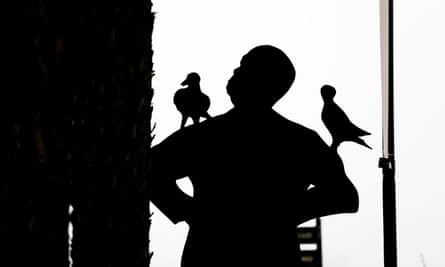Cannes may be the home of France’s biggest and best-known film festival, but the one that’s held in Dinard in Brittany is, in its own way, just as remarkable. For five days at the start of every autumn, this beautifully spick-and-span seaside resort devotes itself to celebrating cinema, with one small but mind-boggling twist: the films it shows are all British and Irish. What’s more, they’re fairly low-budget independent productions – two of this year’s highest-profile entries were The Outrun with Saoirse Ronan and Alice Lowe’s Timestalker. And yet, if you didn’t know any better, you’d assume from the red-carpet premieres, the lavish gala dinners and the sold-out screenings that they were all potential blockbusters and Oscar winners.
It’s no wonder that Rebecca O’Brien, the producer of Ken Loach’s films, counts Dinard as her favourite festival. “I love the blustery, end-of-season French seaside-town atmosphere, with the coves and the casino and the little old-fashioned hotels,” she says. “One of the highlights of my life was when they invited me to be godmother of the festival one year. They put me up in a gorgeous hotel, and they treated me like a queen. It was wonderful. No one else treats producers like that.”
One key reason for this treatment, says O’Brien, is that “the French are such cinephiles, they really do appreciate cinema”. Another reason is that Dinard is proud of its historic links to the UK. According to the festival’s website, “France’s most British seaside resort” came into being in the 19th century when wealthy English visitors took a shine to the sparkling bays, and began dotting the clifftops with villas. “The magic still works,” says the site, “with a ‘so British’ atmosphere hovering over the city’s streets and beaches.”
That atmosphere gets a boost during the festival, when the creperies and stripy-jumper shops have Union Jack bunting in the windows, and Doctor Who phone boxes are installed on the pavements for photo opportunities. I even spotted two policemen in classic bobby-on-the-beat uniforms who turned out not to be French actors in costume, but real Cornish police officers who had been invited over from Dinard’s twin town, Newquay, just to provide some extra British colour. “It’s nuts,” says Andy Brunskill, a producer who took a film, Sweet Sue, to the festival last year. “You feel like round every cliff outcrop you’re going to find a dead body and Poirot’s going to drop in. But what’s more nuts than that is they actually seem to love the Brits and all things British. It’s as if we hadn’t spent the last 10 years being quite so embarrassing on the world stage.”

Dinard has that effect on you: it makes you simultaneously proud and embarrassed to be British. When you look up at the statue of Alfred Hitchcock on the seafront, when you see the queues outside the cinemas for gritty microbudget dramas, when you hear the civic grandees making speeches about their beloved neighbours across the Channel, and when you learn that, in the weeks leading up to the festival, 10,000 schoolchildren are taken to subsidised screenings of British and Irish films, it is, of course, deeply flattering. But at the same time, it does put our own attitude to culture to shame. As Juliet Stevenson said to the audience at the closing ceremony: “I think you love British films more than the British do.”
after newsletter promotion
This year’s event was the 35th, and the first one under its new name: the former Dinard British film festival is now the Dinard British and Irish film festival. It began as a golf tournament between British and French producers, back in “the golden age of British-French co-production”, in the words of the current artistic director, Dominique Green. Golf balls were thwacked, deals were struck, and British films were offered a gateway to the European market. In the early 2000s, a UK cinema fund would pay for a planeload of producers, directors, actors and journalists to fly over every year, and, by all accounts, they wouldn’t stop drinking until they staggered back on to the tarmac at Stansted. But it was all worth it for Dinard, which established itself as the region’s artistic capital.
These days, the festival is a more genteel affair. For one thing, the British independent film industry is gravely under-resourced, and hits the size of The Full Monty and Billy Elliot are essentially a thing of the past. Another factor is that Ryanair stopped flying to the nearest airport in 2021, so now the select British and Irish contingent travels by Eurostar and TGV. The A-list likes of Hugh Grant and Daniel Craig are less inclined to make the trip.
Still, perhaps the intimacy adds to the festival’s curious charm – and again, it prompts the question of why we can’t do things better in the British Isles. “It’s a great opportunity to meet your fellow film-makers,” says O’Brien. “You don’t necessarily see them when you’re busy doing your job in the UK, and you’re often set against each other. But Dinard is small enough for you to chat and have dinner with colleagues you wouldn’t have met otherwise. It’s a triumph, and long may it live.”
Source: theguardian.com

















